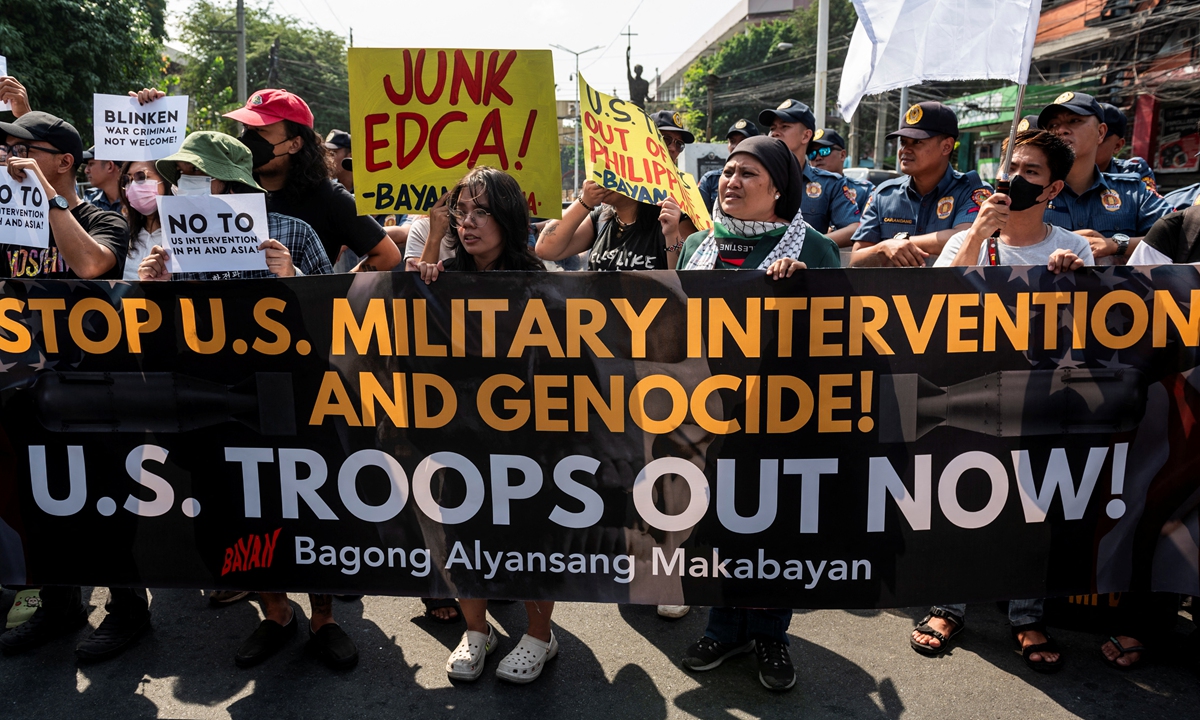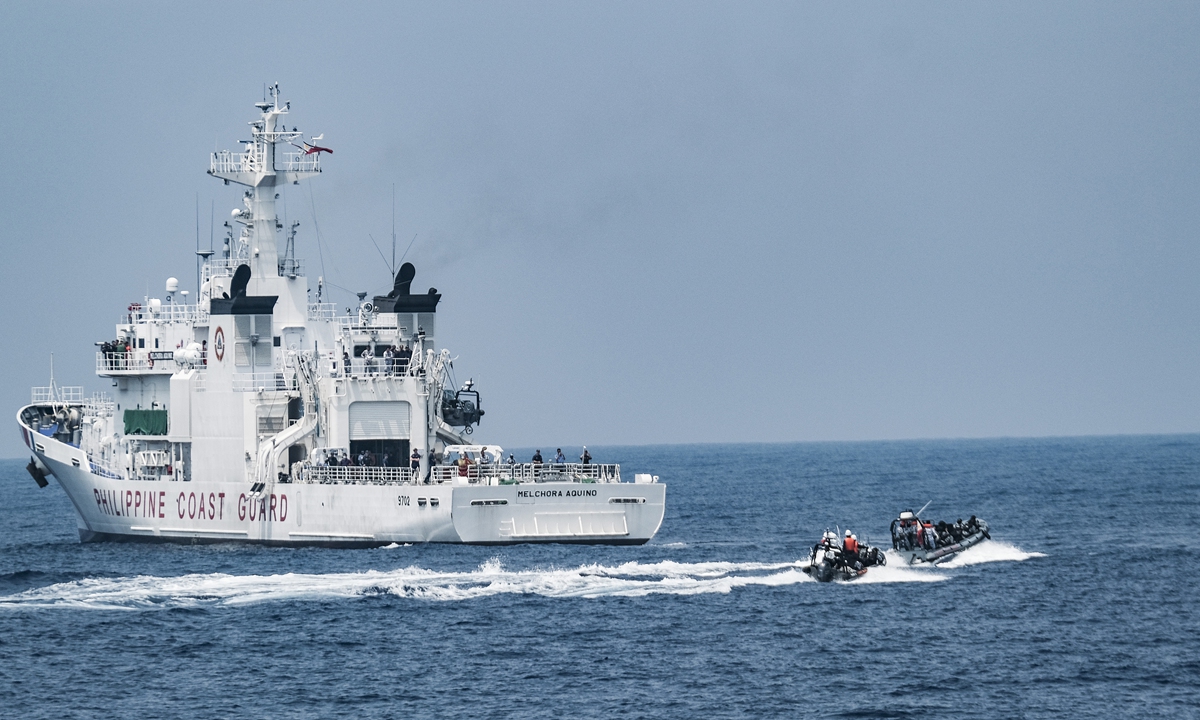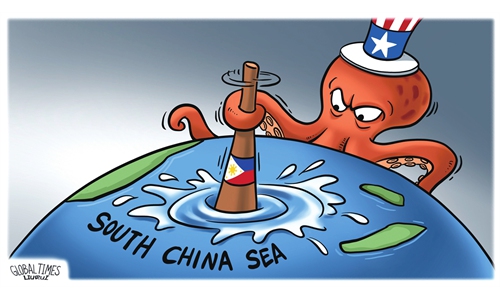IN-DEPTH / DIPLOMATIC CHANNEL
We want peace, prosperity with China, not a war: former Philippine intelligence director
Editor's Note:
As the former director of the Center for Intelligence and National Security Studies in the Philippines, Rommel C. Banlaoi, the Chairman of the Philippine Institute for Peace, Violence, and Terrorism Research, has a deep understanding of Philippine foreign policy and US-Philippine defense cooperation. He was assigned to help advise the president on security matters in 2022, as a deputy national security adviser, but his connections with China were questioned as posing a "security risk" to the Philippines. His nomination was later revoked, local media reported. His experience has seen the Philippine government shift from neutrality to a bias toward the US in diplomacy and defense.
Recently, Banlaoi (Banlaoi) expressed strong dissatisfaction with the current diplomatic and military policies of the Philippines in an interview with Global Times (GT) reporters Hu Yuwei, Fan Wei and Zou Zhidong in Manila. In his view, the diplomatic policy pursued by the current Philippine government and its confrontational measures in the South China Sea not only loses important trading partners like China, but also risks marginalizing the Philippines in the ASEAN.

GT: Since the current Philippine government took office, the South China Sea issue has once again become a focal point in China-Philippines relations and the Philippine government has taken a series of measures that have gradually worsened the situation. How do you evaluate the direction of China-Philippines relations over the last year and a half?
Banlaoi: It is a pity that under the presidency of Ferdinand Romualdez Marcos Jr, the relationship between the Philippines and China has gone so bad because of the issue of the South China Sea.
And also, because of the decision of the current government to increase American military presence in the Philippines, I am dismayed that the Philippines is not balancing the relationship between China and the US, but is exerting more pro-Americanism in foreign policy. The current Marcos administration is creating a lot of difficulties for the improvement and strengthening of Philippines-China relationship.
I consider those unilateral actions by the Philippine government as being counterproductive for the peaceful settlement of disputes with China. In fact, the United Nations Convention of the Law of the Sea (UNCLOS) discourages all parties from conducting such kinds of unilateral activities that are hostile to other parties. I don't consider those kinds of unilateral actions from our government to be beneficial to the peaceful settlement of disputes.
So, what we need is to provide a conducive environment for peaceful negotiations. And the only way to have a peaceful and conducive environment for negotiations is to improve the friendly relationship between the two countries, as if there is no friendship, there's no mutual understanding.
GT: We have seen from news reports that the Philippine government has a plan to recruit fisherfolk militias to further confront China in the South China Sea. Will this further militarize the South China Sea? Is this a part of US-Philippines military cooperation?
Banlaoi: I think it's part of the advice given by the US to pursue such an action, especially in the context of what they call an "offensive transparency strategy" in the South China Sea. What we need now is to sustain the process of direct negotiation, to sustain the process of direct consultation and direct dialogue to manage our differences.
Former president Rodrigo Duterte has initiated the bilateral consultative mechanism [with China] in the South China Sea and it has achieved a lot of gains. For example, in 2017, they formed several working groups to promote joint fishery cooperation. That's what we need in the area. We need fishery cooperation. They also decided to cooperate politically and in security, which would promote marine environmental protection, marine environmental research, search and rescue operations, as well as the freedom of navigation in the South China Sea.
But these efforts have not been sustained under the current government. What we need is to take stock of what we achieved in the past and pursue these achievements and move on to improve our relationship.
So, from the golden age of our relationship, to the current rock bottom of our relationship, I feel bad about that because our countries have enjoyed a fruitful, friendly relationship for a long while. We need that kind of relationship again and the key is to well manage our differences.
If you increase maritime militias in the South China Sea, you are in fact increasing the risk of violence. Let the fisherman be fishermen. If we want to protect our interests in the area, I think that needs all maritime authorities to negotiate an arrangement on how to maintain peace and maritime security in the area.
In order to promote maritime safety in the South China Sea, we need cooperation not competition. The China Coast Guard has demonstrated that it can be involved in the rescue of Filipino fishermen. We have mutual interest and we need to talk about them, instead of the differences.
GT: Is it possible that this militia plan in the Philippines has received financial support from the US, or some other form of support?
Banlaoi: That's possible. They have a way of offering such kinds of support to the Philippines. For example, as a result of the current Philippine President's decision to be closer to the US, the US decided to provide more military assistance funding to the Philippines and the Philippine military can use these funds to train anybody to protect our interests in the South China Sea.
In the past, the US has assisted the Philippines, the Philippine military, and the Philippine militia to fight against terrorism, to fight against Al Qaeda, and to fight against ISIS. They have done that in the past. The US has that kind of track record in supporting our military and our militias in their fight against threats. So, it's possible.

GT: Are these aggressive measures taken by the Philippine government controversial domestically in the Philippines?
Banlaoi: There are people opposing those decisions and I am one of them. I have expressed my opposition against increased American military presence in the Philippines because it is a military rising.
It increases the risks of the Philippines getting involved in an armed conflict that is not beneficial to Philippine national interests. And I hope when that situation comes, China will exercise more patience.
We don't want to take sides between the US and China, but we will side with our interests. Due to the decision by the current president to be closer to the US, we are becoming isolated from the ASEAN.
Many ASEAN member states do not like what we are doing because it is running counter to the principle of the ASEAN of promoting the region as a zone of peace, freedom, and neutrality. The Philippines is no longer neutral because the Philippines has decided to become part of the American strategy in the pacific. The way we handle things is with an American approach, not the ASEAN approach.
GT: What sorts of efforts can we make to restore China-Philippines relationship?
Banlaoi: There are more opportunities coming up to improve the relationship. We will be having a midterm election in 2025. I hope we will be able to elect the right leaders who can better understand the relationship between the Philippines and China and the relationship between the Philippines and the US. We hope to elect leaders in 2025 like senators and congressmen that will have a better understanding of geopolitics and the importance of a friendly Philippines-China relationship.
In my understanding, China has no problem with the Philippines having a good relationship with the US. But the only concern that China has is not to have this relationship used against it. And I admire the foreign policy of former president Duterte, because he initiated the process of decolonization from the US; he even said that he would like to separate from the US, and I think that's the right step. The Philippines cannot be a truly proud, independent nation if we continue to rely on the US.
Our current government is heavily reliant on the US to advance our position in the South China Sea and that kind of reliance is truly hurting Philippines-China relations and is making it difficult to settle our disputes in the South China Sea.

GT: During our days in the Philippines, we hardly felt any hostility from the locals toward Chinese people due to the South China Sea dispute. In contrast, local newspapers were sensationalizing the dispute. Do you think the Filipino people really believe the media's narrative? What are the issues that they truly care about?
Banlaoi: This issue on the South China Sea is only found in the papers in the Philippines that are dominated by Western narratives. But if you go around the country, you'll see that the common people care more about peace in the South China Sea. They don't want war.
They care more about fighting inflation and economic hardship. They care more about making commodities more affordable to them. They care more about having jobs. They care more about having good transportation. We need trains, roads, and bridges that China can provide, and we need more trade with China. It's a pity that many of the narratives in the media are controlled by this Western narrative of anti-China sentiment.
But if you really look around the country, the conflict in South China Sea is the least of their worries. The only thing that they care about is for the fishermen not to lose their livelihoods.
That's why I feel bad that the Philippine government canceled Philippine participation in the projects of Belt and Road Initiative (BRI). And I traveled around and learned that the railways and bridges will no longer be built. They feel bad about it. Ordinary people here care more about economic development.
We want peace and common development with China and don't want a war with China.
As the former director of the Center for Intelligence and National Security Studies in the Philippines, Rommel C. Banlaoi, the Chairman of the Philippine Institute for Peace, Violence, and Terrorism Research, has a deep understanding of Philippine foreign policy and US-Philippine defense cooperation. He was assigned to help advise the president on security matters in 2022, as a deputy national security adviser, but his connections with China were questioned as posing a "security risk" to the Philippines. His nomination was later revoked, local media reported. His experience has seen the Philippine government shift from neutrality to a bias toward the US in diplomacy and defense.
Recently, Banlaoi (Banlaoi) expressed strong dissatisfaction with the current diplomatic and military policies of the Philippines in an interview with Global Times (GT) reporters Hu Yuwei, Fan Wei and Zou Zhidong in Manila. In his view, the diplomatic policy pursued by the current Philippine government and its confrontational measures in the South China Sea not only loses important trading partners like China, but also risks marginalizing the Philippines in the ASEAN.

Rommel C. Banlaoi, Chairman of the Philippine Institute for Peace, Violence, and Terrorism Research Photo: Hu Yuwei/Global Times
GT: Since the current Philippine government took office, the South China Sea issue has once again become a focal point in China-Philippines relations and the Philippine government has taken a series of measures that have gradually worsened the situation. How do you evaluate the direction of China-Philippines relations over the last year and a half?
Banlaoi: It is a pity that under the presidency of Ferdinand Romualdez Marcos Jr, the relationship between the Philippines and China has gone so bad because of the issue of the South China Sea.
And also, because of the decision of the current government to increase American military presence in the Philippines, I am dismayed that the Philippines is not balancing the relationship between China and the US, but is exerting more pro-Americanism in foreign policy. The current Marcos administration is creating a lot of difficulties for the improvement and strengthening of Philippines-China relationship.
I consider those unilateral actions by the Philippine government as being counterproductive for the peaceful settlement of disputes with China. In fact, the United Nations Convention of the Law of the Sea (UNCLOS) discourages all parties from conducting such kinds of unilateral activities that are hostile to other parties. I don't consider those kinds of unilateral actions from our government to be beneficial to the peaceful settlement of disputes.
So, what we need is to provide a conducive environment for peaceful negotiations. And the only way to have a peaceful and conducive environment for negotiations is to improve the friendly relationship between the two countries, as if there is no friendship, there's no mutual understanding.
GT: We have seen from news reports that the Philippine government has a plan to recruit fisherfolk militias to further confront China in the South China Sea. Will this further militarize the South China Sea? Is this a part of US-Philippines military cooperation?
Banlaoi: I think it's part of the advice given by the US to pursue such an action, especially in the context of what they call an "offensive transparency strategy" in the South China Sea. What we need now is to sustain the process of direct negotiation, to sustain the process of direct consultation and direct dialogue to manage our differences.
Former president Rodrigo Duterte has initiated the bilateral consultative mechanism [with China] in the South China Sea and it has achieved a lot of gains. For example, in 2017, they formed several working groups to promote joint fishery cooperation. That's what we need in the area. We need fishery cooperation. They also decided to cooperate politically and in security, which would promote marine environmental protection, marine environmental research, search and rescue operations, as well as the freedom of navigation in the South China Sea.
But these efforts have not been sustained under the current government. What we need is to take stock of what we achieved in the past and pursue these achievements and move on to improve our relationship.
So, from the golden age of our relationship, to the current rock bottom of our relationship, I feel bad about that because our countries have enjoyed a fruitful, friendly relationship for a long while. We need that kind of relationship again and the key is to well manage our differences.
If you increase maritime militias in the South China Sea, you are in fact increasing the risk of violence. Let the fisherman be fishermen. If we want to protect our interests in the area, I think that needs all maritime authorities to negotiate an arrangement on how to maintain peace and maritime security in the area.
In order to promote maritime safety in the South China Sea, we need cooperation not competition. The China Coast Guard has demonstrated that it can be involved in the rescue of Filipino fishermen. We have mutual interest and we need to talk about them, instead of the differences.
GT: Is it possible that this militia plan in the Philippines has received financial support from the US, or some other form of support?
Banlaoi: That's possible. They have a way of offering such kinds of support to the Philippines. For example, as a result of the current Philippine President's decision to be closer to the US, the US decided to provide more military assistance funding to the Philippines and the Philippine military can use these funds to train anybody to protect our interests in the South China Sea.
In the past, the US has assisted the Philippines, the Philippine military, and the Philippine militia to fight against terrorism, to fight against Al Qaeda, and to fight against ISIS. They have done that in the past. The US has that kind of track record in supporting our military and our militias in their fight against threats. So, it's possible.

Filipino activists hold a protest against the visit of US Secretary of State Antony Blinken, in Manila, Philippines, on March 19, 2024. Photo: IC
GT: Are these aggressive measures taken by the Philippine government controversial domestically in the Philippines?
Banlaoi: There are people opposing those decisions and I am one of them. I have expressed my opposition against increased American military presence in the Philippines because it is a military rising.
It increases the risks of the Philippines getting involved in an armed conflict that is not beneficial to Philippine national interests. And I hope when that situation comes, China will exercise more patience.
We don't want to take sides between the US and China, but we will side with our interests. Due to the decision by the current president to be closer to the US, we are becoming isolated from the ASEAN.
Many ASEAN member states do not like what we are doing because it is running counter to the principle of the ASEAN of promoting the region as a zone of peace, freedom, and neutrality. The Philippines is no longer neutral because the Philippines has decided to become part of the American strategy in the pacific. The way we handle things is with an American approach, not the ASEAN approach.
GT: What sorts of efforts can we make to restore China-Philippines relationship?
Banlaoi: There are more opportunities coming up to improve the relationship. We will be having a midterm election in 2025. I hope we will be able to elect the right leaders who can better understand the relationship between the Philippines and China and the relationship between the Philippines and the US. We hope to elect leaders in 2025 like senators and congressmen that will have a better understanding of geopolitics and the importance of a friendly Philippines-China relationship.
In my understanding, China has no problem with the Philippines having a good relationship with the US. But the only concern that China has is not to have this relationship used against it. And I admire the foreign policy of former president Duterte, because he initiated the process of decolonization from the US; he even said that he would like to separate from the US, and I think that's the right step. The Philippines cannot be a truly proud, independent nation if we continue to rely on the US.
Our current government is heavily reliant on the US to advance our position in the South China Sea and that kind of reliance is truly hurting Philippines-China relations and is making it difficult to settle our disputes in the South China Sea.

The US, Japan and the Philippines stage a trilateral Coast Guard drill on June 6, 2023. Photo: VCG
GT: During our days in the Philippines, we hardly felt any hostility from the locals toward Chinese people due to the South China Sea dispute. In contrast, local newspapers were sensationalizing the dispute. Do you think the Filipino people really believe the media's narrative? What are the issues that they truly care about?
Banlaoi: This issue on the South China Sea is only found in the papers in the Philippines that are dominated by Western narratives. But if you go around the country, you'll see that the common people care more about peace in the South China Sea. They don't want war.
They care more about fighting inflation and economic hardship. They care more about making commodities more affordable to them. They care more about having jobs. They care more about having good transportation. We need trains, roads, and bridges that China can provide, and we need more trade with China. It's a pity that many of the narratives in the media are controlled by this Western narrative of anti-China sentiment.
But if you really look around the country, the conflict in South China Sea is the least of their worries. The only thing that they care about is for the fishermen not to lose their livelihoods.
That's why I feel bad that the Philippine government canceled Philippine participation in the projects of Belt and Road Initiative (BRI). And I traveled around and learned that the railways and bridges will no longer be built. They feel bad about it. Ordinary people here care more about economic development.
We want peace and common development with China and don't want a war with China.


